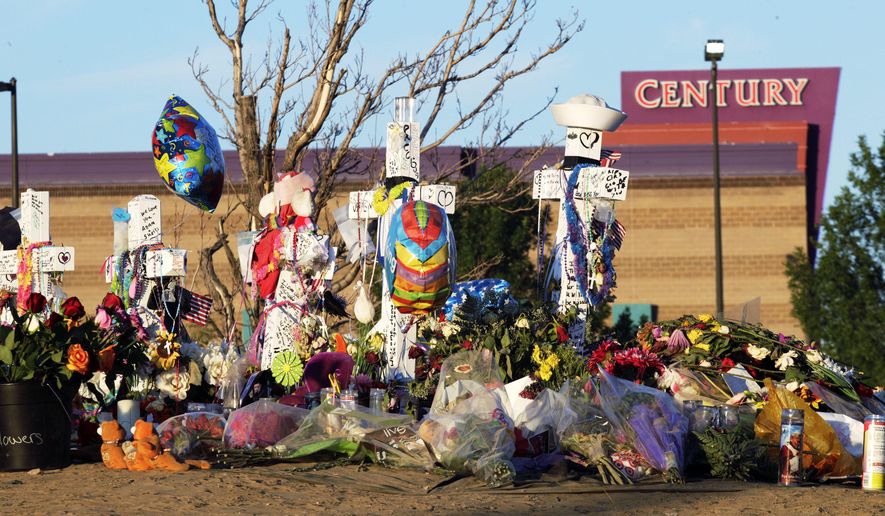DENVER (AP) — One of the deadliest mass shootings in U.S. history will be replayed in a Colorado courtroom — but only after an unprecedented jury pool of 9,000 people is winnowed to a handful to decide whether James Holmes was insane when he opened fire in a suburban movie theater.
Holmes is one of the few suspects to survive such an attack — many are killed by police or commit suicide. His survival has sparked an emotionally charged debate in which his parents have begged for a plea deal that would save his life, while many survivors and family members of victims have demanded that he stand trial and face the death penalty if convicted.
Jury selection begins Tuesday, and the trial could run until October. It could provide a look into the mind of Holmes, whose attorneys acknowledge was the gunman in the July 20, 2012, attack but say he was in the grip of a psychotic episode at the time.
“The public is going to get an insight into the mind of a killer who says he doesn’t know right from wrong,” said Alan Tuerkheimer, a Chicago-based jury consultant. “It is really rare. It just doesn’t usually come to this.”
Holmes, 27, was arrested as he stripped off his combat gear in the parking lot of the Century 16 movie theater in Aurora, where 12 people were killed and 70 injured during a midnight showing of a new Batman movie.
He later pleaded not guilty by reason of insanity to multiple counts of first-degree murder and attempted murder. If jurors find him guilty, they must then decide whether to recommend the death penalty. If Holmes is found not guilty, he would be committed indefinitely to the state mental hospital.
PHOTOS: Theater shooting case draws huge pool of prospective jurors
Under Colorado law, defendants are not legally liable for their acts if their minds are so “diseased” that they cannot distinguish right from wrong. Part of the reason the case has dragged on so long is the battle over whether that standard applies to Holmes.
Few details on those arguments have been made public. Prosecutors and defense attorneys remain under a long-running gag order, and court documents detailing the issue have stayed under seal.
Holmes’ sanity was evaluated by a state psychiatrist but the results were not made public. Prosecutors objected to the findings and persuaded a judge to order a second evaluation. Those results were contested by the defense.
Prosecutors previously rejected at least one proposed plea deal made by attorneys for Holmes, criticizing the lawyers for publicizing the offer and calling it a ploy to draw the public and judge into what should be private plea negotiations.
Survivors of the attack and family members of victims have had a long time to get ready for a trial.
“We’ve all been to therapists and have talked to our families and have our support groups, so we’re prepared,” said Marcus Weaver, who was shot in the arm and whose friend, Rebecca Wingo, died in the attack. “It’s gonna be quite the journey.”
It could take until June to find 12 jurors and 12 alternates who were not biased by widespread news coverage of the shooting.
Equally challenging will be finding jurors who were not personally affected by the attack that sent waves of grief and anger through the Arapahoe County suburbs of Denver.
Judge Carlos A. Samour Jr. called nearly nine times as many prospective jurors as were summoned in the ongoing Boston marathon bombing trial. That meant the county’s 600,000 residents had a nearly one-in-50 chance of being selected.
Among those summoned were at least 13 people who were either witnesses to the attack or have family members who work in the prosecutor’s office. They were quickly excused.
Starting Tuesday, prospective jurors will report in groups of about 250 to fill out a long questionnaire that hasn’t been made public. Those who aren’t excluded because of their answers will be called back for individual questioning.
Potential jurors won’t be allowed to read or talk about the case until they know they’ve been dismissed. That will be difficult in the era of social media, since they have no control over what pops up on their Facebook or Twitter feeds. The final panel won’t be sequestered.
During the selection process, Holmes’ attorneys will focus on picking jurors who are morally opposed to capital punishment, even as prosecutors fight to ensure those on the panel are “death-penalty eligible,” meaning they would be open to executing Holmes.
“It is really stacked against the defense,” said Joseph Rice, managing partner of the Jury Research Institute, a California-based trial consulting firm. “Here, you have a horrific crime occurring in a public setting where you think people would be safe. … Because of the heinous nature of the crime and the number of victims, I can see people who would say, ’In most instances I could not support the death penalty, and in this case, I can.’ “
Enduring the trial from the jury box would seem more difficult than the selection process.
“This is going to be a life-changing event for every juror who sits on the trial,” Rice said. “They are going to deal with life-and-death issues that will forever be part of their experience.”




Please read our comment policy before commenting.